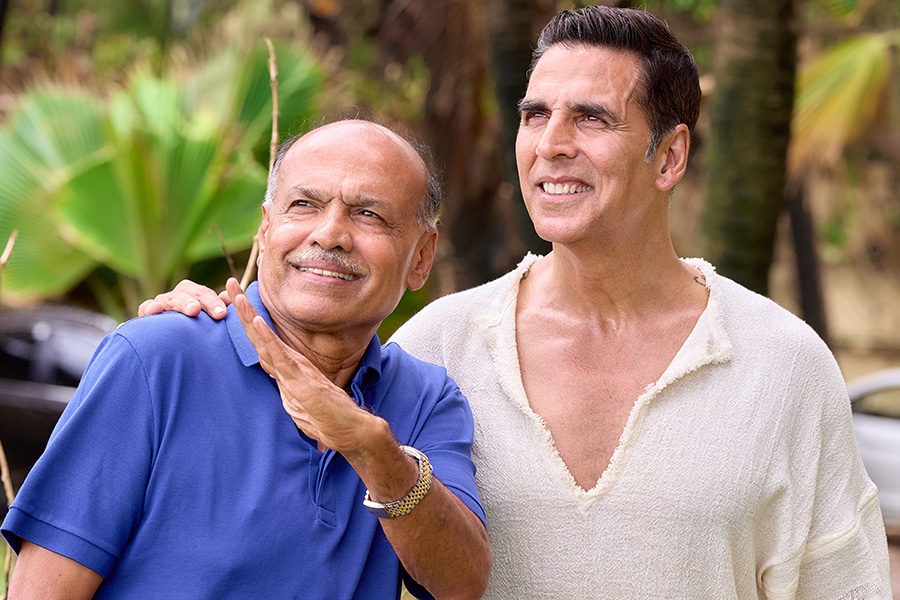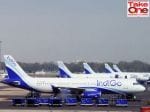You must have the spirit of optimism, that good things will happen: Air Deccan's Captain Gopinath
The aviation entrepreneur on starting a low-cost airline in a hostile environment, locking horns with the corrupt and fighting the forces against him, his wife's support in his audacious dream, and a movie on his life, the Akshay Kumar-starrer Sarfira
 Captain Gorur R Iyengar Gopinath, Founder, Air Deccan
Image: Amit Verma
Captain Gorur R Iyengar Gopinath, Founder, Air Deccan
Image: Amit Verma
Captain Gorur R Iyengar Gopinath is best known for his audacious ploy of offering flight tickets for a rupee. The founder of Air Deccan reveals that the idea of starting a low-cost airline occurred to him when he took one in America and found a carpenter as his co-passenger. I wanted to break caste and class barriers in India, he explains. As he went about pursuing his dream, he claims he had to overcome several hurdles—from dealing with competitors who tried every trick to ensure he did not succeed to corrupt bureaucrats and politicians. Eventually, Air Deccan took to the skies in 2003, with Gopinath having to wait for three years to get a licence.
Q. Sarfira depicts your daring journey. Where did the strength and resilience to overcome multiple obstacles come from?
I was possessed with a dream. My aim was to build an airline where common people can fly. And obviously, there were bound to be setbacks along the way. I did not give up each time I had a failure. That only made me stronger… I wanted to fight the forces that were against me. There were lots of obstacles—from bureaucrats, competitors and politicians to businesspeople. But one learns to take it on your chin and move on. Many people bought into my dream, and though they were not in the spotlight, they remain the unsung heroes. They stood by me, they were committed and sacrificed a lot. It is not enough to be obsessed with your dream, your colleagues and employees must buy into your dream too.
Q. Your wife was one of those who helped you realise your dream. She ran a bakery and put in money when you needed funds.
My wife, Bhargavi, was a big backbone. She had her own dream, she wanted to become an entrepreneur. And she supported my dream without losing her own identity. Usually, in most movies, the hero gets all the screen space, but in Sarfira, director Sudha Kongara has shown that a woman can be a wife and pursue her own dreams. She need not lose her identity or subsume her own personality, while supporting her husband. We both supported each other and that has come out very well in the movie.
Q. Have you seen the movie? What did you think about it?
They have shown a crazy man who was obsessed with a dream. He may have hurt a lot of people and he may have been insensitive to his friends and colleagues—which I was, many times, because you get carried away sometimes by your madness or your ego. And you trample on friendships. Sometimes you don't see your family or children… all those things happened to me. Of course, there is dramatisation, but it has captured the very essence of my life—that one’s spirit will thrive over adversity, and if you are persistent, you will overcome obstacles. The movie has showed that today it’s possible to succeed in India if you have a dream, if you work hard and if you are courageous. I hope people are inspired by it. You have to have the spirit of magnanimity and optimism, that good things will happen.
Akshay Kumar has lived the role of an aviation entrepreneur and Paresh Rawal has played his part of a competitor well. It is not an easy for an actor to play someone else and convey the same emotions, or breathe flesh and blood, and bring realism into that.
Also read: SpiceJet's Ajay Singh wants to bite off more than he can chew. Can he work it out in the end?
Q. You are a pioneer in low-cost aviation. What made you take the plunge?
I was on a Southwest Airlines flight in America… and the guy sitting next to me on that low-cost airline was a carpenter. That’s when I thought, how do I build an airline for the common man in India, so that everyone can fly. The idea was about breaking caste and class barriers. In those days, only less than 1 percent of India was travelling by air. And one small airport in London alone was flying 14 million passengers. However, many did not believe in my dream. Though I also encountered some good people, I had to face a lot of hurdles.
Q. What was your equation with Naresh Goyal? A scene in the movie shows him as your inspiration, but the subsequent narrative is about the tension between you two.
Naresh Goyal created a lot of obstacles in my path because he was worried that his business would be affected. In Parliament, for instance, he would make comments such as, ‘How can you allow a low-cost airline?’. There was one part about him that he wanted to stop me… that was the instinct of a businessman who had succeeded and who didn’t want others to succeed. I was at loggerheads with him and locked horns with him multiple times, but I admired him because he had created a world-class company and built a great airline.
Q. What led to Air Deccan’s closure? Was it financial reasons alone?
Air Deccan was extremely successful. All airlines were losing money that time. There were no airports and there was a lot of pressure. Vijay Mallya [founder and owner of the now-defunct Kingfisher Airlines] had invested in the airline and took over the company.


















